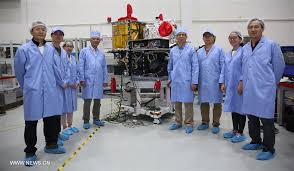
Breaking News
 "You Must Prepare Now" - Doug Casey
"You Must Prepare Now" - Doug Casey
 Will the BRICS 'UNIT' really challenge the dollar?
Will the BRICS 'UNIT' really challenge the dollar?
 The U.S. Just Launched a Secret Dollar Empire (And Nobody Noticed)
The U.S. Just Launched a Secret Dollar Empire (And Nobody Noticed)
 ICE Uses a Growing Web of AI Services to Power Its Immigration Enforcement and Surveillance
ICE Uses a Growing Web of AI Services to Power Its Immigration Enforcement and Surveillance
Top Tech News
 EngineAI T800: Born to Disrupt! #EngineAI #robotics #newtechnology #newproduct
EngineAI T800: Born to Disrupt! #EngineAI #robotics #newtechnology #newproduct
 This Silicon Anode Breakthrough Could Mark A Turning Point For EV Batteries [Update]
This Silicon Anode Breakthrough Could Mark A Turning Point For EV Batteries [Update]
 Travel gadget promises to dry and iron your clothes – totally hands-free
Travel gadget promises to dry and iron your clothes – totally hands-free
 Perfect Aircrete, Kitchen Ingredients.
Perfect Aircrete, Kitchen Ingredients.
 Futuristic pixel-raising display lets you feel what's onscreen
Futuristic pixel-raising display lets you feel what's onscreen
 Cutting-Edge Facility Generates Pure Water and Hydrogen Fuel from Seawater for Mere Pennies
Cutting-Edge Facility Generates Pure Water and Hydrogen Fuel from Seawater for Mere Pennies
 This tiny dev board is packed with features for ambitious makers
This tiny dev board is packed with features for ambitious makers
 Scientists Discover Gel to Regrow Tooth Enamel
Scientists Discover Gel to Regrow Tooth Enamel
 Vitamin C and Dandelion Root Killing Cancer Cells -- as Former CDC Director Calls for COVID-19...
Vitamin C and Dandelion Root Killing Cancer Cells -- as Former CDC Director Calls for COVID-19...
 Galactic Brain: US firm plans space-based data centers, power grid to challenge China
Galactic Brain: US firm plans space-based data centers, power grid to challenge China
China's launch of quantum satellite major step in space race

BEIJING (AP) — China's launch of the first quantum satellite Tuesday will push forward efforts to develop the ability to send communications that can't be penetrated by hackers, experts said.
The satellite launched into space from the Jiuquan launch base in northwestern China's Gobi desert will allow Chinese researchers to transmit test messages between Beijing and northwestern China as well as other locations around the world.
If the tests are successful, China will take a major step toward building a worldwide network that can send messages that can't be wiretapped or cracked through conventional methods.
"It moves the challenge for an eavesdropper to a different domain," said Alexander Ling, principal investigator at the Centre for Quantum Technologies in Singapore. "Lots of people around the world think having secure communications at a quantum level is important. The Europeans, the Americans had the lead, but now the Chinese are showing the way forward."
Quantum communications use subatomic particles to securely communicate between two points. A hacker trying to crack the message changes its form in a way that would alert the sender and cause the message to be altered or deleted.
Researchers around the world have successfully sent quantum messages by land. But a true satellite-based network would make it possible to send quickly encrypted messages in an instant around the world and open the door to other possible uses of the technology.
Cybersecurity has been a major focus in recent years for China, which has pushed regulations aimed at limiting technology imported from the U.S. in the wake of Edward Snowden's revelations of widespread surveillance by the U.S. through the use of American hardware.
China has in turn been repeatedly accused by the U.S. of hacking into computer systems to steal commercial secrets and information that could harm American national security. China has rejected claims that it runs a state-sponsored hacking program and says that it is among the leading victims of cybercrime.
Quantum messaging could become a major defense against hackers and have applications ranging from military and government communications to online shopping.
The biggest challenge, Ling said, is being able to orient the satellite with pinpoint accuracy to a location on Earth where it can send and receive data without being affected by any disturbances in Earth's atmosphere. The results of China's tests will be closely watched by other research teams, he said.
"It's very difficult to point the satellite accurately," Ling said. "You're trying to send a beam of light from a satellite that's 500 kilometers (310 miles) above you."



